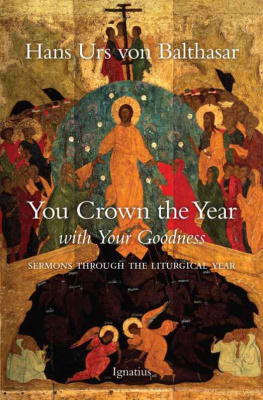CISTERCIAN FATHERS SERIES NUMBER FIFTY-TWO
Bernard of Clairvaux
SERMONS FOR LENT
AND THE
EASTER SEASON
CISTERCIAN FATHERS SERIES NUMBER FIFTY-TWO
Bernard of Clairvaux
Sermons for Lent and the Easter Season
Translated by
Irene Edmonds
Reviewed by
John Leinenweber
Edited and Revised by
Mark A. Scott, OCSO
Introduction by
Wim Verbaal

LITURGICAL PRESS
Collegeville, Minnesota
www.litpress.org
A Cistercian Publications title published by Liturgical Press
Cistercian Publications
Editorial Offices
Abbey of Gethsemani
3642 Monks Road
Trappist, Kentucky 40051
www.cistercianpublications.org
Based on the critical Latin edition of Jean Leclercq and H. M. Rochais, Sancti Bernardi opera , 8 vols. (Rome: Editiones Cistercienses, 195777), 4:33480, 5:1121.
2013 by Order of Saint Benedict, Collegeville, Minnesota. All rights reserved. No part of this book may be reproduced in any form, by print, microfilm, microfiche, mechanical recording, photocopying, translation, or by any other means, known or yet unknown, for any purpose except brief quotations in reviews, without the previous written permission of Liturgical Press, Saint Johns Abbey, PO Box 7500, Collegeville, Minnesota 56321-7500. Printed in the United States of America.
The Library of Congress has cataloged the printed edition as follows:
Library of Congress Cataloging-in-Publication Data
Bernard, of Clairvaux, Saint, 1090 or 911153.
[Sermons. English. Selections] Sermons for Lent and the Easter season / Bernard of Clairvaux ; Translated by Irene Edmonds ; Edited by John Leinenweber and Mark Scott, OCSO ; Foreword by Wim Verbaal. pages cm. (CISTERCIAN FATHERS SERIES; NUMBER FIFTY-TWO) ISBN 978-0-87907-452-4 ISBN 978-0-87907-744-0 (ebook) 1. Lenten sermons. 2. EasterSermons. 3. Sermons, LatinTranslations into English. I. Leinenweber, John. II. Title. BV4277.B47 2013 252.02dc23 2012049284
Contents
An Introduction to Saint Bernards Sermons for Lent and Easter
Wim Verbaal
I N THE INTRODUCTION to the Cistercian Publications translation of Bernards Sermons for Advent and the Christmas Season , the growth of the entire liturgical collection was treated. First of all, the question had to be answered for what reason Bernard took up the charge of writing a completely new homily collection that could never be used by the Cistercian order because the homilies took too much liberty with respect to the Cistercian customs as expressed in the Ecclesiastica officia. The conclusion had to be that Bernard did not aim at a liturgical use of his collection but rather considered it to offer a continuous lectio divina , accompanying the reader through the liturgical year and deepening the readers insight into the liturgical sacralization of the year by each renewed reading.
Another problem posed itself regarding the development of the entire collection, which proved to be more complex than suggested by the editorial work of Dom Jean Leclercq. The succeeding versions corresponded to different organizing principles, and although the basic line did not change fundamentally over the years, each version demonstrated a shift of emphasis within the project. The final version (Pf) managed to bring all these former elements together, harmonizing them into a sublime unifying equilibrium and showing a clear division in four subgroups. Each of these starts with a sermon or a cluster of sermons dedicated to the Virgin (Advent, Purification, Annunciation, Nativity, and Assumption) and ends on the human level (Pauls Conversion, Benedict, Summer Toil, and Humbert).
As far as Bernards compositional directives are concerned, different underlying strands come to the surface, which can be reduced to three organizing principles that give a clear idea of Bernards purpose for the collection. Fundamental to them all is his concept of time. In the first place, the collection conforms to the linear time concept, both of human life from conception or expectancy (Advent) to death or commemoration (Humbert), and of the history of salvation from the desire for liberation to the victory over death, as well as to the linearity of the reading process, which expects progress during reading.
Besides, the collection gives expression to the temporal circularity of the natural and liturgical year, both in its entirety and in its details. In its totality, the collection wants to be read year after year, aiming at a continuous rumination of the liturgical year, thus obliging the reader to lift his experience onto the level that conforms to the liturgical signification of the year, thanks to the repetitive reading of the sermons. In its details, the collection demonstrates how each smaller subgroup or subunit seems to offer a circular reading, bringing the reader back to his point of departure only to realize that this starting point is no longer the same as the one he departed from.
Finally, Bernard introduced a pointed time concept, giving the reader the impression that, actually, there is no time at all. The liturgical allusions in his sermons are not limited to the occasion to which the sermon itself is dedicated, thus implying that each liturgical event includes every other one. Furthermore, as a writer Bernard feels free to handle time according to his own writing purposes, thus creating anti- or even a-chronological events.
In reading the first subgroup, composed of the sermons from Advent until the conversion of Paul, these different compositional strands all appeared and were even reinforced by the themes that seemed to be specific for this unit: desire and recognition. The vocabulary of desire abounds in the sermons for Advent, while from Christmas onward the vocabulary of acknowledgment is privileged, reaching its peak in the sermons for Epiphany and the voluntary submission of the reader to a spiritual leader.
Bernards most important aim in writing, however, is not to offer the reader some intellectual entertainment. He wants to educate the reader. He wants the reader to conform to the evolution as presented inside the sermons. For this reason, Bernard attacks him, he assails him, trying to get a hold on his inner capacities. Within the reading process, thus, Bernard tries to train each of the three capacities of the soul: ratio (reason), voluntas (will), and memoria (memory). Each of them has to be converted, and in the sequence of the sermons Bernard first elaborates the conversion of memory (Advent with a peak in Adv 3), then will (from Nativity to Circumcision), and finally reason (from Epiphany on).
This threefold conversion, however, can be recognized in many of the singular sermons, too, and most clearly in the Conversion of Paul. In this sermon, will is the last to be converted, after memory and reason. This sequential shift was linked to the fact that Bernard, at the end of the sermon, leaves the reader with the image of the blinded Paul, waiting for the man who will release him from his darkness and give him back the light. In fact, the conversion of reason in the sermon did not lead to the acknowledgment of insight but rather to the consciousness of its lack. The conversion sermons, as the entire unit from Advent to Paul was called, did not aim at true knowledge of Gods mysteries but rather at the recognition of the deficiency of mans unconverted reason to understand Gods glorious truth. For this reason only, some glimpses of Gods glory had been allowed to his eyes, notably in the sermons for Epiphany. Inevitably, man thus became aware of his own blindness and remained stuck in his desire for liberation out of the captivity of his own defects. It can be expected that the unit of sermons following will first of all try to heal this mental blindness of the reader by giving him the recognition of insight.
Next page













